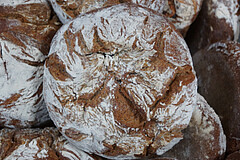High quality bread – gluten-free [19.08.22]
How can we succeed in baking bread that is absolutely gluten-free and that is similar to what we are used to, both in terms of taste and texture? This question is being investigated by the collaborative project PROTAX with the participation of the University of Hohenheim. The researchers are relying on gluten-free starting materials such as oats, corn, and rice. The German Research Foundation (DFG) is funding the project in Hohenheim to the tune of EUR 380,000 – a heavily funded research area in Hohenheim.
Given the growing number of people who want or need to avoid the wheat protein gluten, there is a growing demand for high-quality but gluten-free everyday foods, especially bread. However, despite intensive research activities, gluten-free breads are still often unable to compete with conventional products at the present time.
This is because gluten, together with water, forms a network during dough preparation that gives the bread structure and stability by binding water and capturing any gases that are formed. As a result, the bread becomes airy with an elastic crumb. It is true that efforts are already underway to improve gluten-free breads, for instance by using various additives and enzymes or sourdough fermentation. However, the complete replication of the gluten network has not yet been achieved.
The quality that comes closest to that of wheat bread is obtained with rye flour. This is due not only to the gluten that is also contains. It is specifically the arabinoxylans (AX) that can replace the gluten network to a certain extent. As a scaffolding substance, these carbohydrates lend stability to plant cell walls and could be obtained from rye bran, a waste product of the food industry. Initial pilot-scale trials have proved to be promising.
Researchers led by Prof. Dr.-Ing. Mario Jekle from the Department of Plant-based Food at the University of Hohenheim are of the opinion that arabinoxylans possess major potential. They could be added to gluten-free flours as natural baking aids. However, such pure carbohydrate networks do not reach the quality of the ones formed from gluten, which is why the researchers in the project are pursuing a new approach: With the help of special enzymes, proteins and arabinoxylans are to be crosslinked. This is a process that could occur naturally in rye flour during sourdough leavening by plant enzymes.
The protein-arabinoxylan network formed by this novel crosslinking could have properties similar to gluten. This would then significantly improve not only baking properties, but also the structure, texture, and taste of the products. The researchers believe that oats, corn and rice are particularly promising raw materials. This is because they have a high content and a high quality of the above-mentioned components.
In addition, the expertise could be transferred at a later stage to other food systems, such as meat substitutes.
Project details
- Title: Enzymatically induced protein-AX networks in gluten-free systems – PROTAX
- Funding amount: EUR 379,951 (University of Hohenheim)
- Funding institution: German Research Foundation (DFG)
- Project duration: 1 October 2022-30 September 2025
- Collaborative project:
- Project manager Germany: Prof. Dr.-Ing. Mario Jekle, University of Hohenheim,
- Cooperation partners: Austrian Agency for Health and Food Safety (AGES, Project Management Austria), University of Natural Resources and Life Sciences Vienna (BOKU), Department of Food Science and Technology (DLWT)
Contact
Prof. Dr.-Ing. Mario Jekle, University of Hohenheim, Department of Plant-based Food,
+49 711 459-22314, mario.jekle@uni-hohenheim.de
Heavyweights of research
The series “Heavyweights of Research" presents outstanding research projects with a financial volume of at least 350,000 euros for research requiring equipment or 150,000 euros for research without specialized equipment.


